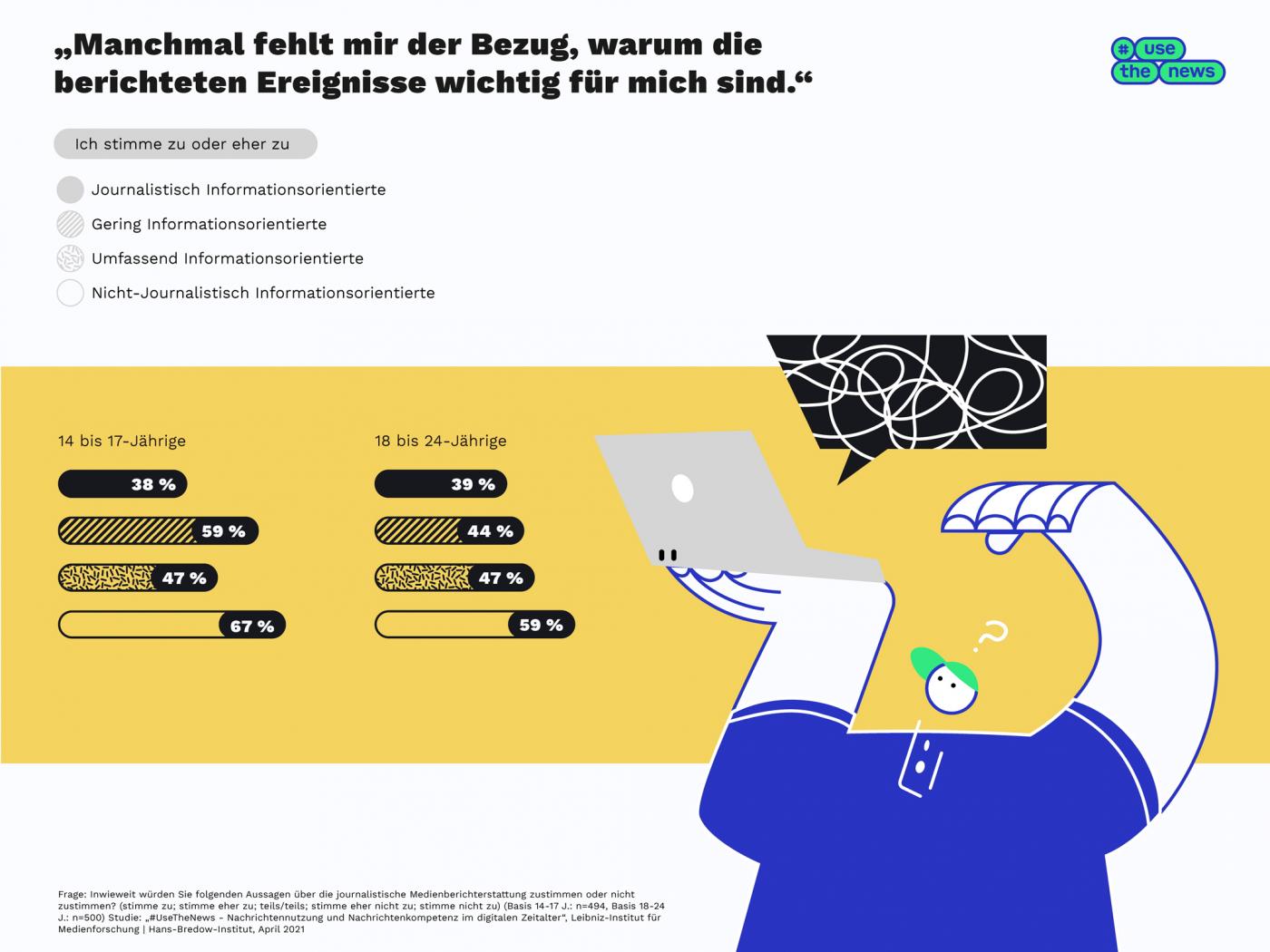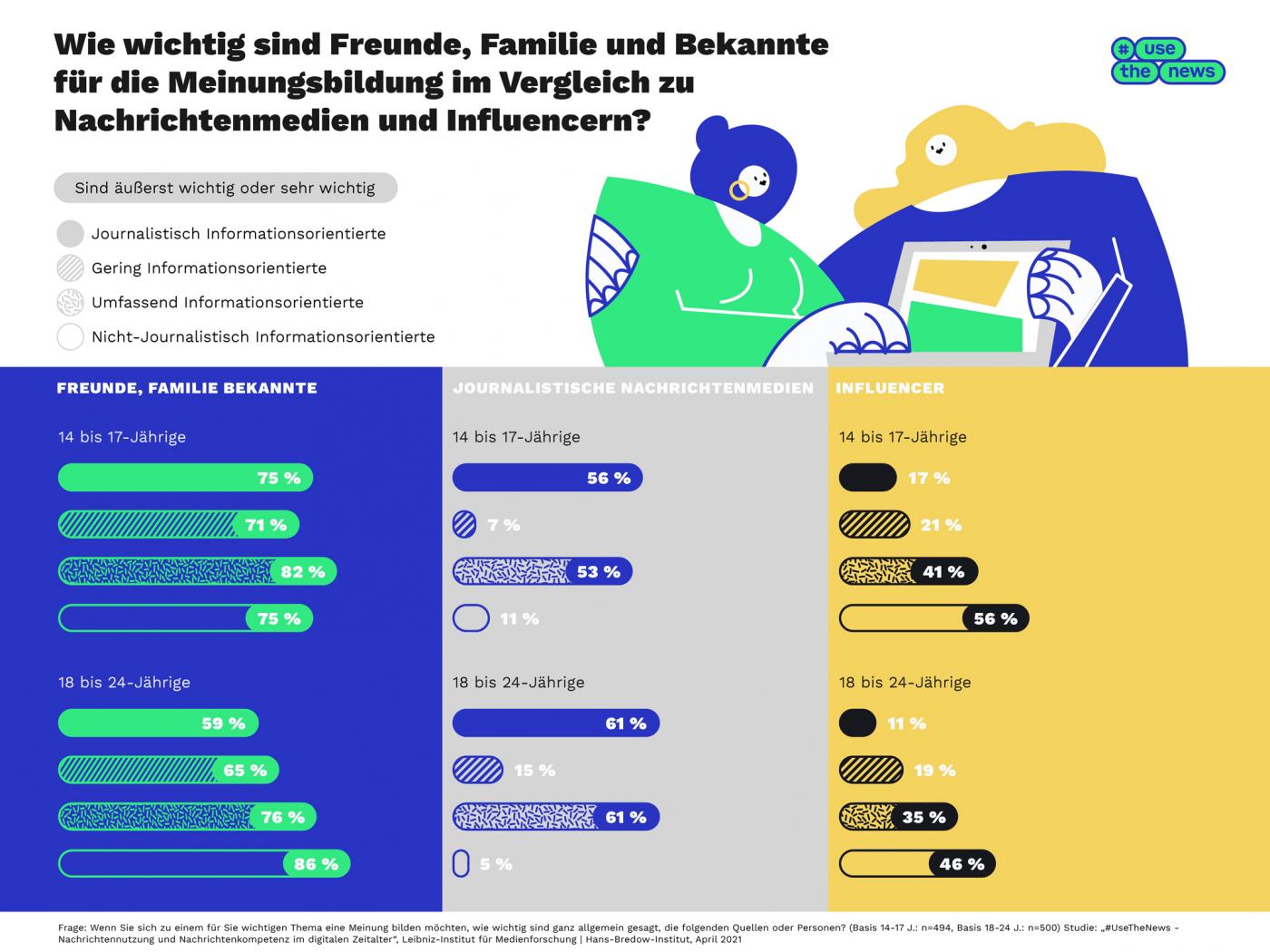The 91-page survey provides trendsetting insights for the media industry. Even if many young adults use social media frequently, this does not indicate automatic interest in news. Many consume news on TV or radio, read a daily newspaper or news online. "Providers of journalistic news have to fight constantly for relevance anew. Our strong team in the #UseTheNews project is striving to find suitable answers for our future offers," said Peter Kropsch, CEO of dpa.
Some 50 per cent of young people do not consider it important to be informed about news and current affairs resulting in a strong information gap as they are significantly less informed than their peers who use journalistic news sources regularly, according to a nationwide #UseTheNews survey entitled "Nachrichtennutzung und Nachrichtenkompetenz im digitalen Zeitalter“ (News Usage and News Literacy in the Digital Age). The survey was conducted by the Leibniz Institute for Media Research on behalf of Deutsche Presse-Agentur dpa and the Ministry for Culture and Media in Hamburg.
Trendsetting survey for media industry
How do young people consume news?
The prototypical teenager or young adult does not exist prompting researchers to derive four types of news consumers from the survey:
1. Journalistically information-oriented: keen interest in news, extensive use and great relevance of journalistic sources with low relevance of non-journalistic offers; well informed
2. Low information-oriented: low interest in news, no use and relevance of journalistic sources with low use and relevance of non-journalistic offers; not well informed
3. Comprehensive information-oriented: keen interest in news, extensive use and great relevance of journalistic and non-journalistic offers; well informed
4. Non-journalistic information-oriented: medium interest in news, no use and relevance of journalistic sources with high relevance of non-journalistic offers; not well informed.
Lack of relevance to people's lives
Half of the teenagers and young adults surveyed do not consider it important to be informed about news and current affairs. News frequently lacks relevance to their everyday lives, according to more than two-thirds of the non-journalistic information-oriented (67 per cent) 14 to 17-year age group. This figure was slightly lower (59 per cent) in the 18 to 24 year age group, but came to slightly under 40 per cent for youths and young adults respectively with the strongest link to media (journalistically information-oriented).
Slightly under half (46 per cent) of the young people aged between 14 and 17 surveyed devote themselves to journalistic offers several times a week, but 58 per cent also look at non-journalistic offers.

Friends, family help form opinions - impact of influencers
News of a journalistic nature is no longer crucially important to young people when it comes to forming opinions. Friends, family and acquaintances have a noticeably higher relevance. The personal environment is on a par with news media for the 18 to 24-year-olds alone (59 per cent and 61 per cent respectively). The high relevance of influencers on opinion forming is striking among non-journalistically information-oriented people, but also among the comprehensively information-oriented. Thus, 41 per cent of the 14 to 17-year age group (comprehensively information-oriented) and 35 per cent of 18 to 24-year-olds consider influencers "extremely and very important" for forming their opinions.
Everyday relevance and added value
Providers of journalistic content must highlight the everyday relevance of their offers for adolescents and young adults, according to authors Uwe Hasebrink, Sascha Hölig and Leonie Wunderlich from the Leibniz Institute for Media Research in Hamburg. "We can only set ourselves apart successfully from non-journalistic and opinionated players through solid craftsmanship as well as reliable and in-depth content from different perspectives and create convincing added value for which people are willing to pay money when in doubt."

Survey of 1,500 people
The interplay between news interest, news use, informedness and opinion forming was examined for the survey. Emphasis was on the importance of various journalistic and non-journalistic news offers. A total of 1,508 people in the age groups 14 to 17 years, 18 to 24 years and 40 to 50 years were interviewed face-to-face between October 12 and December 6, 2020 for the survey.
#UseTheNews
The nationwide #UseTheNews project addresses young people's news use and news literacy and aims to develop new information and educational offers. New offers are to be designed in a News Literacy Lab based on the results of the survey. The News Literacy Lab is backed by journalism experts from the Hamburg University of Applied Sciences (HAW). This year's Scoopcamp, underway from September 15-16, 2021 will also focus on journalism for and by young people. The Hamburg Innovation Conference for Media is organised by nextMedia.Hamburg and dpa.
sb/pb
Sources and further information
More
Similar articles

Hamburg launches "Bridges to Apprenticeships" scheme

Estonia's MeetFrank job portal focusing on work-life balance

Chamber of Commerce presents plans for downtown Hamburg
